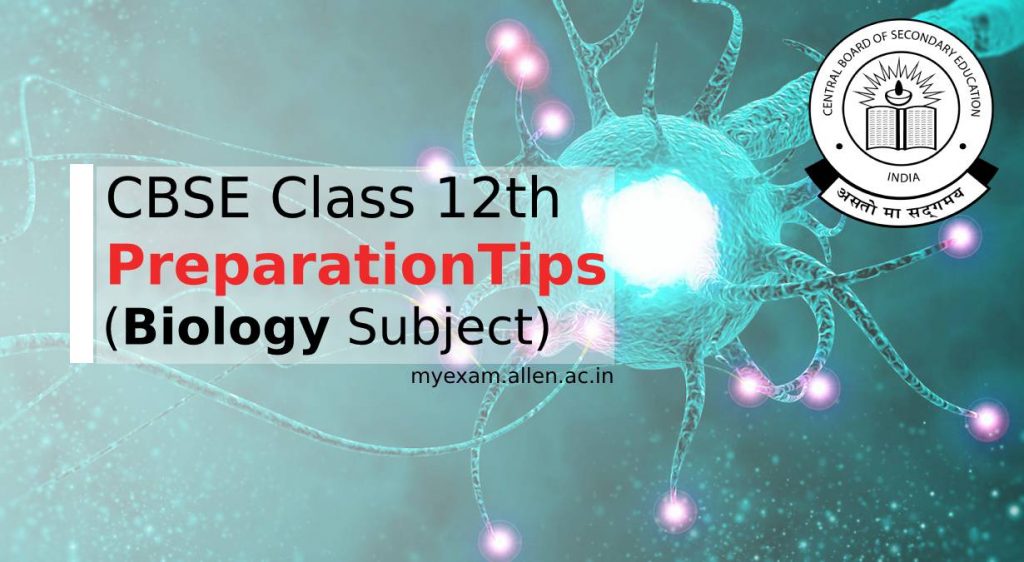
To succeed in the examination, studying with Right preparation strategy plays a vital role. While you are appearing for a Board Exams it is very important to have the right preparation strategy in place. However, this becomes more effective if you are mentored by the expert. The experts not only make you aware of the preparation tips but they also guide you about the important topics from the examination viewpoint. And here at ALLEN, we are ahead to help the student fraternity.
The following tips for 12th board examination are devised by our subject experts to help the student prepare and study in a better way.
Lets begin with a Checklist for the Examination:
- Be relaxed and confident in the examination hall
- Be punctual as the entry in the examination hall will be exactly at 10 AM and no student will be permitted post the entry time.
- The question paper will be distributed at 10.15 AM and you would be given exactly 15 mins to read the question paper
- Seal of the answer sheet will be removed at 10.30 AM and you will have precisely 3 hrs. to finish your paper so manage your time effectively
- Make sure you answer every question in a clear handwriting
- Do not make use of red, green, and any other coloured pen
- Try to complete your paper at least 10 to 15 minute before, so that you have time to briefly recheck of your answer
- Make sure to recheck your answer script as it will help you in avoiding any silly mistake
ALLEN Career Institute announces admission for Session 2020-21 for JEE (Main+Advanced), JEE (Main), Pre-Medical (AIPMT (NEET-UG)/ AIIMS), Pre-Nurture & Career Foundation (Class VI to X, NTSE & Olympiads). Click Here: www.allen.ac.in
CBSE Class 12th Biology Subject Preparation Tips:
- Pay attention and focus on NCERT
- For a better understanding of NCERT accompany it with additional notes
- To boost your revision speed, make sure you summaries the chapter in pointers and most importantly in your own words.
- Practice drawing the diagrams with correct labeling.
- Biology is a language based subject so it requires a frequent reading so that you can develop a practice of cumulative revision.
- Solve all the questions of NCERT that are given for every chapter
- As 1 and 2 mark questions are based on the terminologies, make sure you note down all the important terminologies in a separate notebook
- Prepare a study plan and make sure it is time bounded for all the subjects
- Solve sample paper as it will help you in boosting your confidence
- Try to understand the topics instead of rote learning them
- To break the monotony, occasionally study with your friends and discuss some explanatory topics
CBSE Class 12th Biology Paper Pattern
- The question paper has a total no. of 27 questions.
- There are 5 sections in question papers (A) (B) (C) (D) & (E)
- All 27 questions are compulsory but, internal choice is provided.
Section A
- Contains 5 questions (Q – 1 to Q – 5)
- Multiple choice questions like NEET
- Each question carries 1 mark
- Internal choice is available in two questions
Section B
- Contains 6 questions (Q – 6 to Q – 12)
- Very Short Answer type questions (Answer them in brief, no detailing is required)
- Each question carries 2 marks
- Internal choice is available in one question
Section C
- Contains 9 questions (Q-13 to Q – 21)
- Short Answer Type questions and includes Figure based- question (Answer them in brief with short explanation)
- Each question carries 3 marks
- Internal choice is available in two questions.
Section D
- Contains 3 questions (Q-22 to Q-24 )
- Case and observation based questions
- Each question contain 3 marks
- Answers must be based on the basis of the case
- No internal choice is given in this section
Section E
- Contains three questions (Q – 25 to Q -27)
- Each question carries 5 marks
- Long answer type questions. Make sure you answer as per the demand of question (Change of paragraph must be done in this part)
- Internal choice is available in all three questions
Important Topics for CBSE 12th Biology Subject
Unit:-1 Reproduction
- Types of reproduction, Clone, Vegetative propegration, Event of sexual reproduction.
- Development of microsporangium and megasporangium, pollen grain, structure of ovule, pollination, artificial hybridization, double fertilization, monocot-dicot embryo, parthenogenesis.
- Male and female reproductive system, gametogenesis, menstrual cycle, fertilization and implantation, development of embryo, parturition and lactation.
- Reproductive and child health program, SID’s, MTP, infertility (IVF, ZIFT, GIFT)
Unit:-2 Genetics and Evolution
- Mendelian inheritance, incomplete dominance, co-dominance, multiple alleles. Chromosome theory of inheritance. Sex determination (humans, birds, honey bee) Linkage and crossing over. Sex-linked inheritance – haemophilia, colour blindness,
- Mendelian disorders – sickel cell anemia, phenylketonuria, thalassemia
- Chromosomal disorders – Down’s syndrome, Turner’s and Klinefelter’s syndromes.
- Structure of DNA and RNA, DNA packaging, DNA replication , Search for Genetic material, DNA as genetic material, Central dogma-transcription, genetic code, translation, Lac operon, Human genome projects, DNA fingerprinting.
- Origin of life , Biological evolution and evidences for biological evolution, Darwin’s contribution, modern synthetic theory of evolution. Mechanism of evolution. Adaptive radiation. Hardy – Weinberg’s principle, Gene flow and genetic drift, Human evolution
Unit:-3 Biology in Human Welfare
- Human diseases (malaria, filariasis, ascariasis, typhoid, pneumonia, common cold, amoebiasis, ringworm), Basic concepts of immunology – vaccines. Cancer, HIV, Allergies, Drugs and Alcohol abuses.
- Improvement in food production:- Plant breeding, tissue culture, single cell protein, Biofortification. Animal breeding- Inbreeding and Out breeding, Artificial insemination and MOET. Dairy farm management, Poultry farm management, Apiculture and Fisheries.
- In household food processing, Industrial production, Sewage treatment, Microbes as biocontrol agents and biofertilizers. Antibiotics.
Unit:-4 Biotechnology
- Biotechnology principle, Restriction Enzyme, Plasmid, Gel electrophoresis, Polymerase chain reaction, Bioreactor.
- Application of biotechnology in health and agriculture, Human insulin and vaccine production, gene therapy, Bt crops, transgenic animals, biopiracy, and patents.
Unit:-5 Ecology
- Organisms and environment – Habitat and niche, major abiotic factor population and ecological adaptations. Population interactions. Population attributes – growth, birth rate and death rate, age distribution.
- Ecosystems: Patterns, components. Productivity and decomposition. Energy flow. Pyramids of number, biomass, energy. Nutrient cycles (carbon and phosphorous). Ecological succession. Ecological services – carbon fixation, pollination, oxygen release
- Organisms and environment – Habitat and niche, major abiotic factor population and ecological adaptations. Population interactions. Population attributes – growth, birth rate and death rate, age distribution.
- Ecosystems: Patterns, components. Productivity and decomposition. Energy flow. Pyramids of number, biomass, energy. Nutrient cycles (carbon and phosphorous). Ecological succession. Ecological services – carbon fixation, pollination, oxygen release
Sample Paper for CBSE Class 12th Biology Subject:
The above-mentioned tip will certainly help you in clearing the examination in flying colours. We hope that the coin flips in your favour. All the Best!!!



